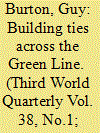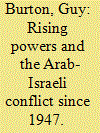| Srl | Item |
| 1 |
ID:
151491


|
|
|
|
|
| Summary/Abstract |
In 2011 Palestinian youth joined together across the Green Line, demonstrating grassroots solidarity and a challenge to the elite consensus in favour of the two-state Oslo process. The movement drew inspiration from the concurrent Arab Spring and the Boycott, Divestment and Sanctions movement, organising joint demonstrations in Israel and the occupied Palestinian territory. However, the movement struggled to develop as a result of challenges regarding its objectives, strategy and representation, and of external threats from Israel and Palestinian political elites.
|
|
|
|
|
|
|
|
|
|
|
|
|
|
|
|
| 2 |
ID:
116891


|
|
|
|
|
| Publication |
2012.
|
| Summary/Abstract |
This article accounts for the conceptualisation of development by the Palestinian Islamist party, Hamas. It concludes that Hamas's position on development can be seen in either two ways: 1) as broadly similar to mainstream neoliberal development; or 2) as significantly different and an alternative type of development. Which view taken depends on whether an Orientalist or non-Orientalist approach to understanding development is employed (with Orientalism linking development, modernity and progress with the West and denying it to the non-West). While an Orientalist view assumes that development only occurs within narrow parameters, obliging the non-West to 'catch up', a non-Orientalist approach would study Islam on its own terms-and therefore see Hamas's approach to development as an alternative to mainstream thinking. To account for this, the article studies the basis of knowledge in Orientalism and Islamic thought alongside Hamas's rise from its foundation in 1987 to its control of Gaza in mid-2007.
|
|
|
|
|
|
|
|
|
|
|
|
|
|
|
|
| 3 |
ID:
184467


|
|
|
|
|
| Summary/Abstract |
Who are the most notable and successful political leaders in the Middle East? Employing the concept of political time and through a survey of textbooks and popular history books relating to the region, 22 prominent individuals are identified in the modern period (i.e. since 1800). All were male and half of them came from the regional core (i.e. Egypt and the Mashreq countries). The leaders mainly came from the establishment and the armed forces. They mostly exercised power during the second half of the twentieth century. Many of them governed for long periods of time. Half of them were forcibly removed from office. The reasons for their removal were for political rather than economic reasons; there was little difference in economic performance between leaders who were forcibly removed and those who were not. However, one distinction between the two types of leaders was over their level of public spending. Those who kept government spending over 20% of GDP were less at risk. Ultimately, what made a political leader successful involved the following: an ability to act independently; avoiding forcible removal from office; and his political regime surviving his departure.
|
|
|
|
|
|
|
|
|
|
|
|
|
|
|
|
| 4 |
ID:
161286


|
|
|
|
|
| Publication |
Lanham, Lexington Books, 2018.
|
| Description |
xviii, 187p.hbk
|
| Standard Number |
9781498551953
|
|
|
|
|
|
|
|
|
|
|
|
Copies: C:1/I:0,R:0,Q:0
Circulation
| Accession# | Call# | Current Location | Status | Policy | Location |
| 059520 | 956.04/BUR 059520 | Main | On Shelf | General | |
|
|
|
|
| 5 |
ID:
169443


|
|
|
|
|
| Summary/Abstract |
Where does the UAE’s Federal National Council fit in the scholarship on comparative legislative studies? Is it a “transformative” and “active” assembly (i.e. it makes legislation and policy) or is it an “arena” and “reactive” assembly (i.e. it focuses on public debate and policy influence)? Constitutionally, the FNC is portrayed as one of the Arabian Gulf region’s weaker assemblies. This article challenges that assumption. An analysis of the FNC’s media coverage in two newspapers in 2011–15 shows that its members’ actions resulted in the body acquiring a more expansive role. Members went beyond their formal revising powers of bills to propose legislation and funding and challenge ministers. The analysis also identifies members’ subject priorities (i.e. the economy and social security) and backgrounds, including more media attention accorded to members from smaller/poorer emirates (i.e. not Dubai and Abu Dhabi) and little difference between those who were elected and appointed.
|
|
|
|
|
|
|
|
|
|
|
|
|
|
|
|